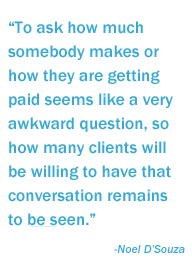Noel: However, even with this fee transparency, clients really don’t have a sense of how the fees they are paying compare to what options are available to them in the marketplace. So a client may be told they are paying $2500 in fees on their $100,000 investment a year, but the question is; do they have to pay $2500 for their fees? Are they getting good value  for their money? What should they be getting for that $2500? I think many clients aren’t aware of what they should be getting as part of financial advice or financial planning and they don’t know how that $2500 compares to what else is available in the market. Is that low? Is that high? They have transparency but not context.
for their money? What should they be getting for that $2500? I think many clients aren’t aware of what they should be getting as part of financial advice or financial planning and they don’t know how that $2500 compares to what else is available in the market. Is that low? Is that high? They have transparency but not context.
There has been backlash in the industry against CRM2, there are segments fighting the ban on embedded commissions – requiring a specific fee to be charged instead, which is what happens in many other countries – saying that advisors will go out of the industry and that people will be left without financial advice. They’ve also been fighting a fiduciary standard for advisors, where advisors will be required to put their clients best interests first, rather than just meeting a suitability requirement, saying that the funds that we sell are suitable but not necessarily in their best interest, the industry has been fighting that as well, saying that more regulation will slow things down and put unfair burdens on advisors.
So while there is going to be greater transparency, the onus is still on the client to be knowledgeable and willing to have a conversation around compensation, which can be an uncomfortable conversation to have with an advisor. To ask how much somebody  makes or how they are getting paid seems like a very awkward question, so how many clients will be willing to have that conversation remains to be seen. Chances are very few will, unless they are really confident and assertive. What Canadians really need is assurance that their advisors are working on their side.
makes or how they are getting paid seems like a very awkward question, so how many clients will be willing to have that conversation remains to be seen. Chances are very few will, unless they are really confident and assertive. What Canadians really need is assurance that their advisors are working on their side.
Karin: Absolutely, and when you consider the level of avoidance, disinterest and worry that so many Canadians have around finances, to expect that they are going to take charge in these areas, it’s just not realistic. Clients do have a responsibility to be informed, but I think that the industry also has responsibility, and it’s unbelievable to me that anyone in the advisor industry is resisting the notion of fiduciary duty. I imagine that the public would just expect that they had that fiduciary duty; that it shouldn’t even be up for any kind of argument.
One of the things that the media has done is, in its attempt to inform the public and even level the playing field, is focus on the atrocities of high fees, and in Canada we do pay particularly high fees relative to other countries, however, I think the conversation has to go beyond the fee. My concern is if the focus is on just the lowest fee, then decisions may be made on that basis alone, to the detriment of the client. Because in a lot of cases, the lowest fee means the lowest amount of service or advice but it could also mean that they are giving up advice in other areas of their personal finances.
Where clients can really help themselves is to become really clear on what it is that they need in terms of service and advice and then to find appropriate avenues to have those needs satisfied. At the same time, the financial industry has to do a better job of being clear about what they offer and what they don’t offer and what the cost is, so that there is transparency not only on fees, but also on value and specific services provided for those fees. Then I think the public may have a fighting chance to actually discern what offering is going to be in their best interest.
Noel: Right, I think there are misconceptions of what financial planning is. The most common view of financial planning is that it’s about saving for retirement, or investing, which is also often tied to retirement planning. And the industry has promoted that definition of financial planning because that’s where they’ve made the bulk of their money, selling products.
That’s why I like the term Money Coach. When you say you’re a Money Coach it starts a conversation, it doesn’t come with all the assumptions that saying you’re a financial advisor does. I have the chance to talk about all that financial planning really is, and how investing is the final step, not the first thing, and most definitely not the only thing, that people should think about.
Karin: Earlier we spoke briefly of the inherent conflict of interest that arises in the commission based model and at times even in the percentage fee model, I think we should elaborate.
For example,if a client comes to a financial advisor with an inheritance of $200,000 and if they’ve got a mortgage for instance, if the advisor is being compensated by investment sales and managing larger investment portfolios, then it’s going to be a challenge for the advisor to tell the client they should take that $200,000 and pay it against their mortgage vs. investing. If they advise to pay off the mortgage there is no compensation to the advisor, whereas if they have $200,000 more to invest that’s where they’ll make their money. Even advisors who work hard to do what’s in their clients best interest, have to consider that they need to make a living, and if that living is dependent on investment sales, then it’s inherently difficult to provide unbiased advice.
Noel: It might even be that the advisor has their employer putting pressure on them to sell certain products or generate a certain number of new clients, or bring in a certain number of new assets, so they have quotas imposed on them from above, that might restrict them. So in that example you just cited, if the client has a $200,000 mortgage with the bank and a $200,000 inheritance that they could use to pay down the mortgage, well the bank has a mortgage that they are earning income from, and if the client was to buy $200,000 in investments the bank would again earn fees from that as well. If the client on the other hand, was advised to pay down the mortgage the bank would lose the mortgage income they are getting and they would lose the potential income from investment fees. It’s not hard to imagine which way an advisor may feel compelled to advise.
Karin: Which is certainly one of the reasons I think you and I, and some of the other Money Coaches through Money Coaches Canada, made the choice to operate on a fee-for-service only basis. So that when we are looking at our client’s situation, regardless of  whether it’s investing or mortgage decisions, or estate planning decisions, or tax decisions, that there is never any vested interest in any of the advice that we provide, because we’re not being compensated on the basis of any of that specific advice.
whether it’s investing or mortgage decisions, or estate planning decisions, or tax decisions, that there is never any vested interest in any of the advice that we provide, because we’re not being compensated on the basis of any of that specific advice.
Noel: Exactly, and beyond the understanding of compensation and its implications on the advice given, I would like to see Canadians move away from the notion that more money is the answer to their financial worries. And this may be a broader discussion than what we are talking about here today, but I see it all the time, people who make great money, have the investments, but they still feel stressed and unsatisfied. I would like to see Canadians move to a model of financial planning that answers the bigger question of what do I want my life to be? And then teaches them to use their resources to get that life.
Karin: Absolutely, and I think that’s a great place to end our discussion, thank you Noel.
Noel: You’re welcome, it was my pleasure.

